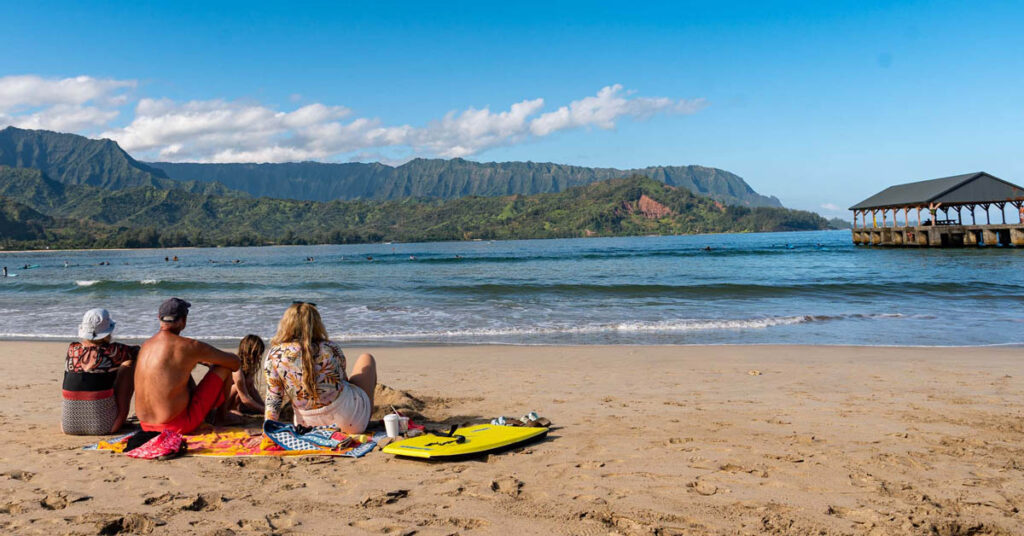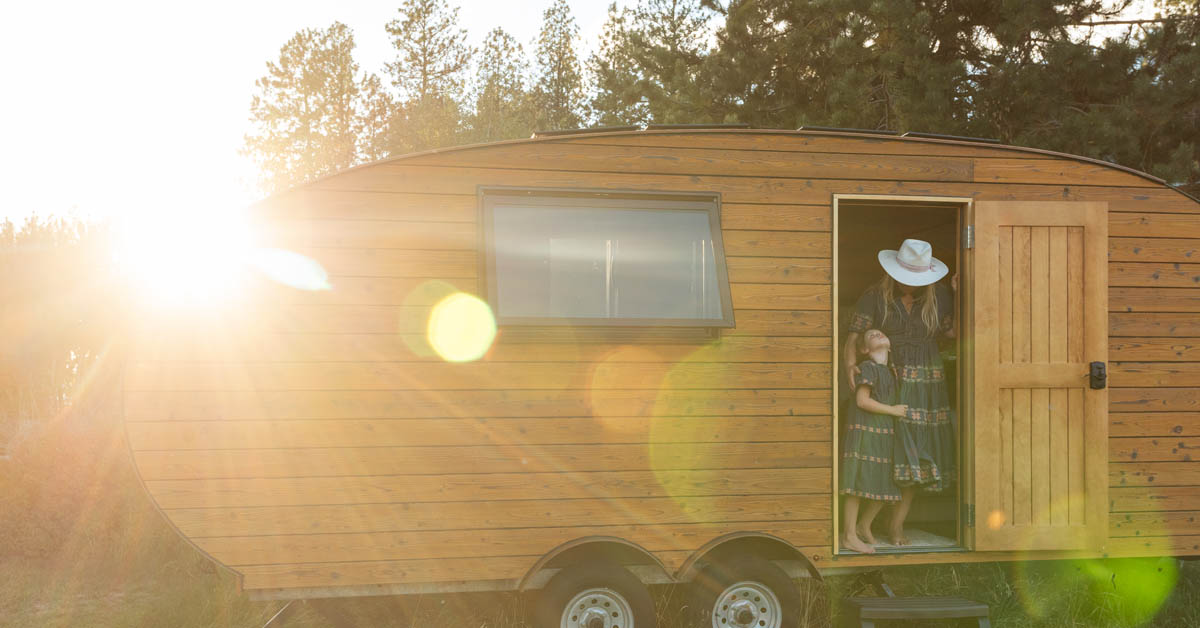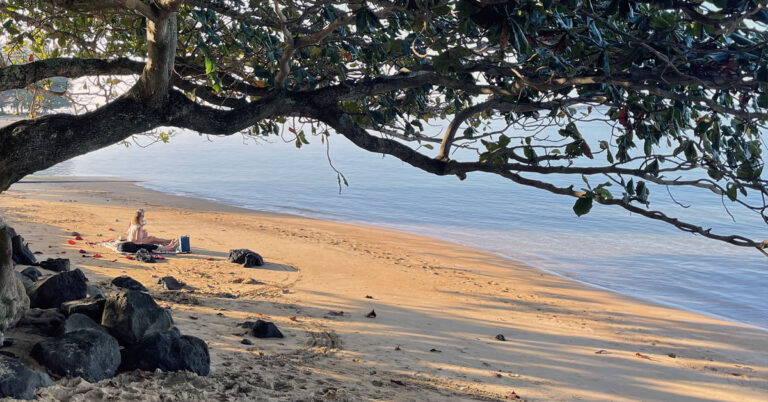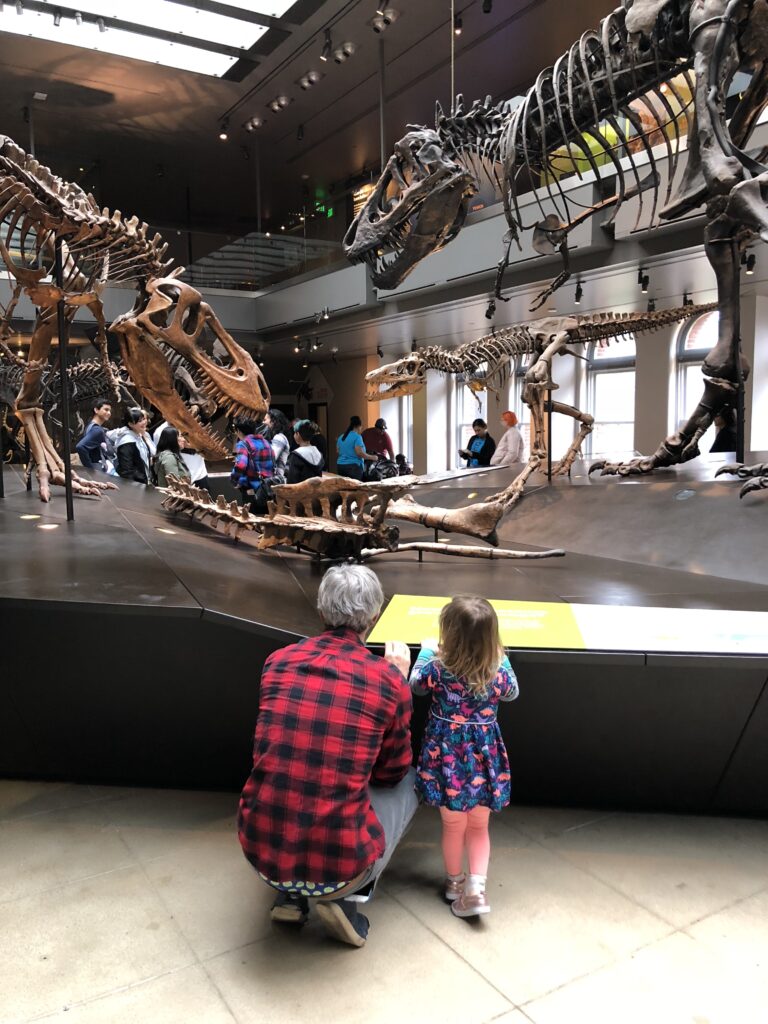If no one else is going to say it, I will – Vacations are expensive.
I don’t know why it feels taboo to admit that. To say, “Hey… :
- taking the family to Disney for a few days for $5k puts a dent in the bank account.”
- Hotel ‘parking’ charges of $25 – $50 are a bit chafing.”
- I’m not sure how many hundreds of dollars champagne and a sunset are actually worth.”
In general each of us doesn’t talk about money, or the complicated feelings that go into spending it. So, we just swallow it down or suffer in silence…
So let’s just be comfortable with ourselves, our lives, and our choices. And then, admit…somethings are expensive – and that’s ok. We can be ‘ok’ saying that – we’re all still good people who make a positive impact on our community and work hard.
Now I’m going to honestly talk about my budget travel mindset
In our family, I’m definately the most money conscious, especially when traveling. For a long time, it was hard for me to get over each expense leading up to and during a trip.
This mindset really made enjoying travel hard.
It’s not exactly like I kept a running tally in the back of my head throughout trips. (Which actually might be more helpful) Instead, whenever we got a bill that set off my ‘ok, we’re spending real money here’ alarm, I’d round up to the nearest $500 increment and then generalize that price over the entire trip. It was not unusual, and actually pretty routine, for me to say things like – “Oh my God, we’re spending $2,000 today. We need to go home early.”
Clearly this is not a good way to travel, but I was not and am not alone in thinking this way. This sorta – vacation-financial-ruin – worry…I’m seeing it peek out in all sorts of weird places.
The examples that always stick out to me are from our last trip to Disney. I saw a guy wearing a Mickey Ears shirt that read “The Most Expensive Day Ever”. After seeing that one shirt, I started noticing that same sentiment on dozens of shirts.
- #Broke (with Mickey Ears as the ‘o’)
- “Bibbidy Bobbidi Broke”
- “The Most Financially Irresponsible Day Ever”
I identify with this tribe, but also hate it.
I mean, enjoyment has to be bigger than the price. I read a product review a few years ago that echoes this and also really redefined the way I see things : “This product is great, but it’s expensive. If you’re worried about the cost – you’ll never think this is worth it.”
That applies to really everything in life, but it especially applies to adventures/travel/getaways. And the second I embraced this way of thinking – things started to change.
It was a Team Effort – and I leaned heavily on Jade
Somehow Jade doesn’t get overwhelmed with price. Or, at least, she’s better at seeing the forest through the trees / the experience past the expense.
I’m going to be honest – for about the first decade of our relationship, I didn’t interpret this as a good thing. I read her ability to see past the cost as her not being financially responsible.
But really – who’s not being financially responsible, the person who spend the money and enjoys the trip or the person who spends the same money and is miserable the whole time?
Jade’s able to see the costs and balance them against experience…that’s like the hardest thing for me to do. But, it’s the most necessary trait for travel planning.
I don’t know if this financial trait is something certain people are born with, or if its some way that responsible people level-up. Whatever it is, it didn’t come naturally to me. So, Jade and I had to have a talk about managing money and expectations. (I mean, we were never going to stop going on trips – so we had to find a balance where we could both enjoy the trip.)
After a bit of trial and error and a bit more real world experience, we came up with a few tactics that help us manage the overall cost of each trip, and (more importantly) we figured out a way to keep the overall price out of my head while traveling.
I wouldn’t say that I’m super cool about a $3k weekend getaway, but, if we’re out the door, I’m no longer keeping a spiraling Excel sheet in my head.
Here are our Tips for Managing the Finances Stresses of Travel :

Let’s start with Planning
- Plan Based on Keystone Activity, Not Destination
We’ve found that we are more in control of the final price if we choose to travel in order to have an experience rather than visit a particular place. Beaches and skiing are great examples because there are iconic destinations (Panama City Beach or Jackson Hole) that are higher priced than destinations that have equally good versions of the experience (like Jupiter Beach or Mt. Bachelor). Now both PCB and Jackson Hole have more to offer than just any beach, right? But, if you are just wanting a ‘beach/ski vacation’ a major destination city’s other amenities are mostly irrelevant.
*Tip* : Define ‘how you want to spend your vacation’. Then look for lesser known destinations that offer these specific activities.
- Chose a Budget Flexible Destination
From the very start of Vagabond3, our focus has been on figuring out ‘when to splurge and when to save’. Well, some destinations help to do this more than others. (Ie : All of Aspen’s hotels are expensive. But nearby Breckinridge has a wider range of accommodation price points that let you determine the cost of your trip based on your personal desired experience.)
- Book Accommodations Based on How You’ll Use Them
To be honest, pretty much every hotel we’ve ever stayed in (with only a few exceptions) has been ‘fine’. We’ve stayed in just about every chain and had every possible room configuration, and we’ve found that (while individual hotels might stand out) there isn’t a perfect chain – each one gives guests a unique balance of benefits and drawbacks. So, we don’t really book based on brand name anymore.
Instead, we book accommodations by thinking about how we plan to use the room while visiting the destination. Then we compare additional amenities each hotel/home offers that would help to enhance our visit. Thinking this way has almost always given us a better expense-to-experience balance.
Here are 2 examples :
-
- When were staying in Santa Fe, we knew our main city attractions were in-and-around Historic Downtown. So, we looked for hotels that would allow us to visit the downtown easily and breakup our days with a space to rest between shopping/museums/margarita trail, etc. After narrowing down the search area by walkability, we looked for hotels with family-friendly sized rooms (since we would be spending extra time in the room between daily events) as well as kid-friendly amenities (ie pool and hot tub). That’s how we ended up in the Drury Hotel. This hotel also offered convenient parking (without having to navigate the small downtown streets) and a complimentary happy hour.
- On our last trip to Maui, we split our trip in half to save on car rental. We dedicated the first few days to Hana and then the remainder of our trip, we wanted to not have a rental car. So, we looked for an experience-forward hotel; a place with a great beach, exciting pool, convenient for excursion pick-up, and on site dining with other options within walking distance. We decided on Fairmont because the beach out front was home to numerous sea-turtles and on site they have a wide variety of restaurants and bars – with even more within a short walk.
- Know when to Rent a Car and When to Hire a Car
This one has taken me a while to adjust to, but – we frequently don’t hire a car for the full trip. For city destinations, airport shuttles can get you back-and-forth from your hotel. Then, if we’re wanting to go on a road trip, we’ll rent the car for a few days during the trip (sometimes even then relying on a hired car or a private rental app which can have better short-rental-rates).
On the other hand, If we’re planning on visiting somewhere that often requires a taxi/hired car (at least 2x in a single day), a rental car will be the best budget option.
- Double Check Your Luggage
Incidentals kill me. I hate arriving to a destination and having to pay for toothpaste, diapers, underwear, etc. because these charges become part of the trip expense rather than everyday costs of life. Double checking for necessities (and, yes, proper clothes are a necessity) makes sure you don’t have to tack on a run to the local shop in a resort town where a $5 pair of Target sunglasses go for $20.
- Set Expectations
Be clear with each member of the family ahead of time what will be happening and what won’t be happening throughout the trip. This is not a chance to dash everyone’s dreams, it’s a chance to let everyone especially the kids know what to look forward to.
**A key part of this for us is setting souvenir expectations. We usually make sure Augustine knows that she only gets 1 souvenir from the entire trip.
Ok, Now Let’s Talk About Actually Paying
- Determine the Best Budget and then Come in Under Budget
Nothing feels as good as getting a deal, which is sorta the same feeling that’s triggered when a trip doesn’t use up the entire vacation fund.
First, this isn’t a fake game we play with ourselves. The budget we create for the trip is usually put together after we’ve done some price research. So, we’re dealing with the actual cost – not some inflated number that we can come in under.
Then, be clear about where the budget is along the way, and let your partner know where everything stands.
Finally, coming in under your budget during your pre-trip also takes some of the sting out of incidentals along the way and can even make sure that you don’t go way over your initial budget while actually traveling.
- Determine the Actual Cost, Before Booking
Surprise fees can really get under my skin and stay there for days. (I still think about the random U-haul place that had its own ‘mandatory insurance’). You’ll never be able to calculate everything, but to help foresee and manage ‘additional’ fees, we also try and determine the actual total cost before committing to any reservation. Things to keep in mind are:
- Accommodation Parking – Parking fees and (if traveling with others) maximum parking allowance per reservation
- Resort Fees – These are the worst, especially in a place like Vegas where you get a ‘resort fee’ even if you’re staying 10 miles off the strip. These aren’t charged in advance so do a bit of research and then add those into your expected trip total.
- Tipping – This is a little bit sneaky. When we do excursions, there’s always a pressure to tip the guide. We determine ahead of time how much to tip based on the experience fee. (If the experience is expensive, then we tip waay less – if at all. A $500 a person experience should be able to pay their host a descent wage)
-
- Just a side note, in vacation destinations – everywhere encourages tipping. It’s ok not to tip just because you’re presented with the option.
-
- Extras – Leave in money (usually $100-ish a day) for unexpected expenses along the way. This isn’t to cover snow cones (which are just like going to be bought), it’s for things like the carrousel or fun house or museum, etc. This bonus cash is to cover experiences that you discover while on your trip and you definately want to do.
- Prepaying in Advance of the Trip
This is key to letting you and your partner’s minds forget the expenses during the trip. Not having to physically look at a bill throughout your vacation separates the money from the experience. We pre-book and prepay for as much as we can : our travel extras (ie checked bag), accommodations, rental cars and experiences.
A weird side note to add is that statistically, the height of the travel experience is during the pre-planning. So, the excitement of upcoming travel sorta acts like a pillow to spending the money. Also, you can choose when to pay for things when working in advance as opposed to paying for a rental car, hotel, dining all in the same six hours.
- Spreading Activity Costs Out Over Several Trips
Getting a Season or Yearly pass dramatically reduces the overall cost for travel throughout the year, and makes shorter trips or time-flexible trips way more attainable.
Instead of focusing on one big ticket item for a single trip, consider paying a bit more in the short term and doing the big ticket item several times throughout the year. The most accessible way to do this is with Season Passes. We’ve had a ton of fun with ski passes the last couple of years (which is literally the only way I would ever be able to actually relax enough to go skiing), and we also found that once we started buying National Park Yearly Passes – we went to the parks more often and felt more financially positive during and after each trip.
Finally, How to Manage all this During the Trip
- Realize the Value of $1
There are a couple of ways of saying this, but each is essentially just a cute way of saying…”$1 is worth more or less depending on the situation”.
At the end of the day, your overall budget isn’t made or broken by $5-$10. I think the idea of death by 1000 cuts is a common way of thinking about costs, but I’m not sure that mindset is the most accurate for traveling.
For me, I’ve had to realize that going out to dinner at a fancy restaurant and ordering the cheapest thing on the menu is not the best way to value $1. Usually something like the meatloaf and the house steak are really only about $10 apart. This is when to splurge because in reality the meatloaf is overpriced and the actual experience isn’t eating, it’s dining out. Eating the thing you actually want makes the expense worth the cost.
- Does Cooking In Actually Happen – like for normal People?
Let’s be honest, most Air B&B kitchens are left untouched. But, we do use ours. We use ours every trip. We make dining-in part of the experience. We typically don’t cook diners, but :
- We usually do at least a small breakfast at the rental unit which makes getting up and going easier. And, it gets us past hangry mornings.
- We sometimes do lunch at the rental – especially if we are breaking up the day.
- We always do desserts at home because it’s just cozy.
- We will do dinners at a rental whenever we are traveling with other families. It’s easier to feed several kids at a house than when dining out.
- The Budget is Everyone’s Responsibility
For years (most of the time I’ve been with Jade) I tried to manage the budget by robbing myself of each experience. I’d always choose smaller/cheaper food, I wouldn’t dream of getting a souvenir, I would put the things I wanted to do last. All that time, I thought I was allowing everyone else to have a better trip, but I was essentially staying-at-home on vacation and it made me hate going on trips.
Making sure that the family doesn’t overspend while traveling is everyones responsibility. Each person is part of making the choices that help the whole have fun.
In the end, it’s good to keep in mind that a lot of budget-terror-relief comes down to working as a team and trusting your partner. When you get back home, no one wants to have to mortgage the house (or, in our case, set up a lemonade stand) to make ends meet. Everyone has to trust that the whole family (well, at least the adults) are working hard to balance the daily life finances with the expenses of traveling.
And, look, my experience at least says that this mindset shift is easier said than done. It can be hard to see money going out the door and trust that it’s being done responsibly, but (like I said before) the vacation, the budget, the experience – it’s everyone’s responsibility. One person alone can’t ‘save the family from financial ruin’ while traveling through London, but that one person can make the experience miserable by cutting so many corners that they shouldn’t have left home in the first place.
Plan ahead so you can see the world within budget, and then let that part of your mind take its own vacation.



